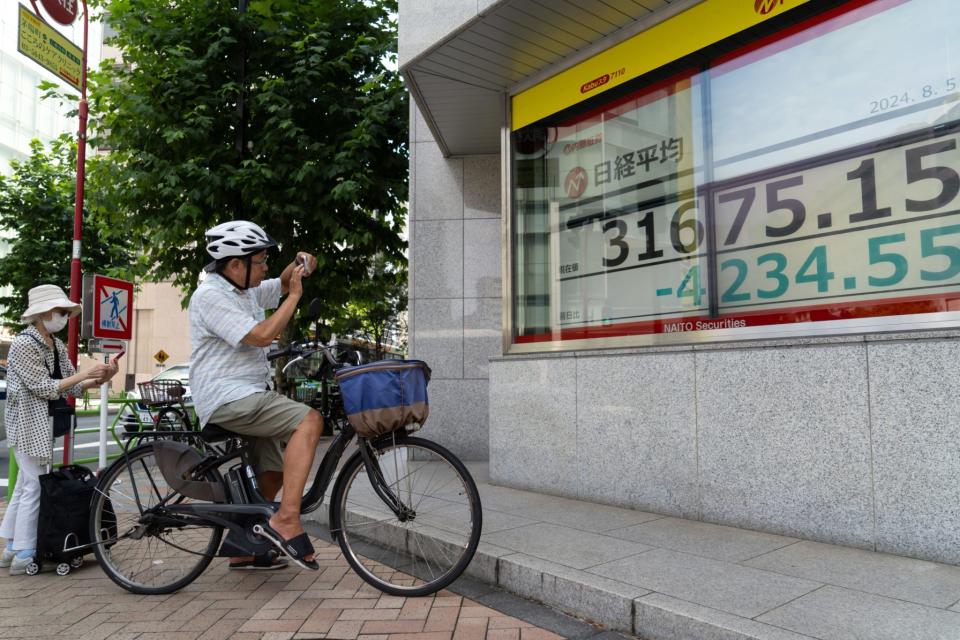Asian markets are in meltdown as Japan erases all the gains from this year’s record-breaking stock rally

Monday was a day of records in Asian markets—the bad kind. The U.S. market rout that started last week extended its spread to Asia, with equity markets starting the week with massive drops, some by as much as double-digits.
Both major Japanese equity indices, the Nikkei 225 and the broader Topix index, dropped by over 12%. The former index, which tracks 225 companies listed on the Japanese stock market, lost over 4,400 points, its biggest loss in point-terms.
The Nikkei 225 has now erased its gains to date, reversing a stock market rally that sent the Japanese index past a 34-year-old record earlier this year.
Analysts think the sell-off will continue. Investing in the Japanese market now is like “catching a falling knife,” Kelvin Tay, UBS’s regional chief investment officer, told CNBC Asia.
Last week, the Bank of Japan hiked interest rates for the second time this year. (Japan's central bank hiked rates for the first time in 17 years in March). That helped spark a rebound in the yen, which in recent months fell to record lows against the U.S. dollar.
A stronger yen makes stocks more expensive for foreign investors, and potentially drags down earnings from major firms on the Tokyo stock exchange, as exports become more expensive and repatriated profits drop in value.
For instance, a weaker yen helped Toyota to record-high net profit for the quarter ending June, despite declining sales.
Shares in major Japanese companies plummeted Monday, tracking the markets. Toyota, Japan’s most valuable company, saw its shares drop by 13.7%, wiping out 5.6 trillion yen ($39.3 billion) in value. Nintendo shares dropped 16.5%, following weak earnings from the video game company on Friday. Tokyo Electron, a major supplier of chipmaking tools, fell 18.5%. Softbank dropped 18.7%, marking the worst day for the tech giant since it went public in 1998.
Other Asian stock markets fell too
Markets in South Korea and Taiwan dropped too, with tech stocks hit particularly hard.
South Korea’s benchmark KOSPI index closed down 8.8%, its largest drop since October 2008. The Taiex, Taiwan’s benchmark index, dropped 8.4%, the worst sell-off since 1967.
Shares of Asian chipmaking companies associated with the AI boom dropped on Monday, following similar plunges from U.S. tech shares last week. Taiwan’s TSMC and Korea’s Samsung and SK Hynix, which all make semiconductors key to the AI boom, were down around 10% on Monday.
The tech-heavy Nasdaq is down 10% from its record close on July 10.
Other Asian markets dropped Monday, though to a lesser extent. Hong Kong’s Hang Seng Index fell 1.4%. India’s NIFTY 50 is down around 2.7%.
Why are Asian markets dropping?
In addition to Japan’s moves on the yen, Asian investors may also be worried about weak economic data from the U.S. that could portend future recession. On Friday, the U.S. Department of Labor reported that just 114,000 jobs were created in July, far below economist expectations. The U.S. unemployment rate rose to 4.3%.
Analysts expect the U.S. Federal Reserve will cut interest rates in September. Yet DBS chief economist Tamur Baig warned in a report that these expectations may not do much to buoy stocks, as those with substantial capital are “trigger happy to sell at this juncture.”
Tech stocks have also taken a beating in recent weeks. Political and regulatory uncertainty is hitting chipmaking shares, as the Biden administration reportedly considered new export controls on China, and as the Republican presidential candidate, former president Donald Trump, suggested that the island of Taiwan—a key chipmaking hub—should pay for its own defence.
AI-related stocks have also declined as investors start to wonder when the benefits of the AI boom will materialize. Investors may also be profit-taking, noted Saxo’s head of equity strategy Peter Garnry, on share surges from companies like Nvidia and Super Micro Computer.
“There’s been a dramatic shift in market narrative from last week,” Saxo global market strategist Charu Chanana told Reuters. “U.S. economic data remains in the driving seat now, and the more the U.S. soft landing assumption gets questioned, the further pullback we can see.”
This story was originally featured on Fortune.com

 Yahoo Finance
Yahoo Finance 